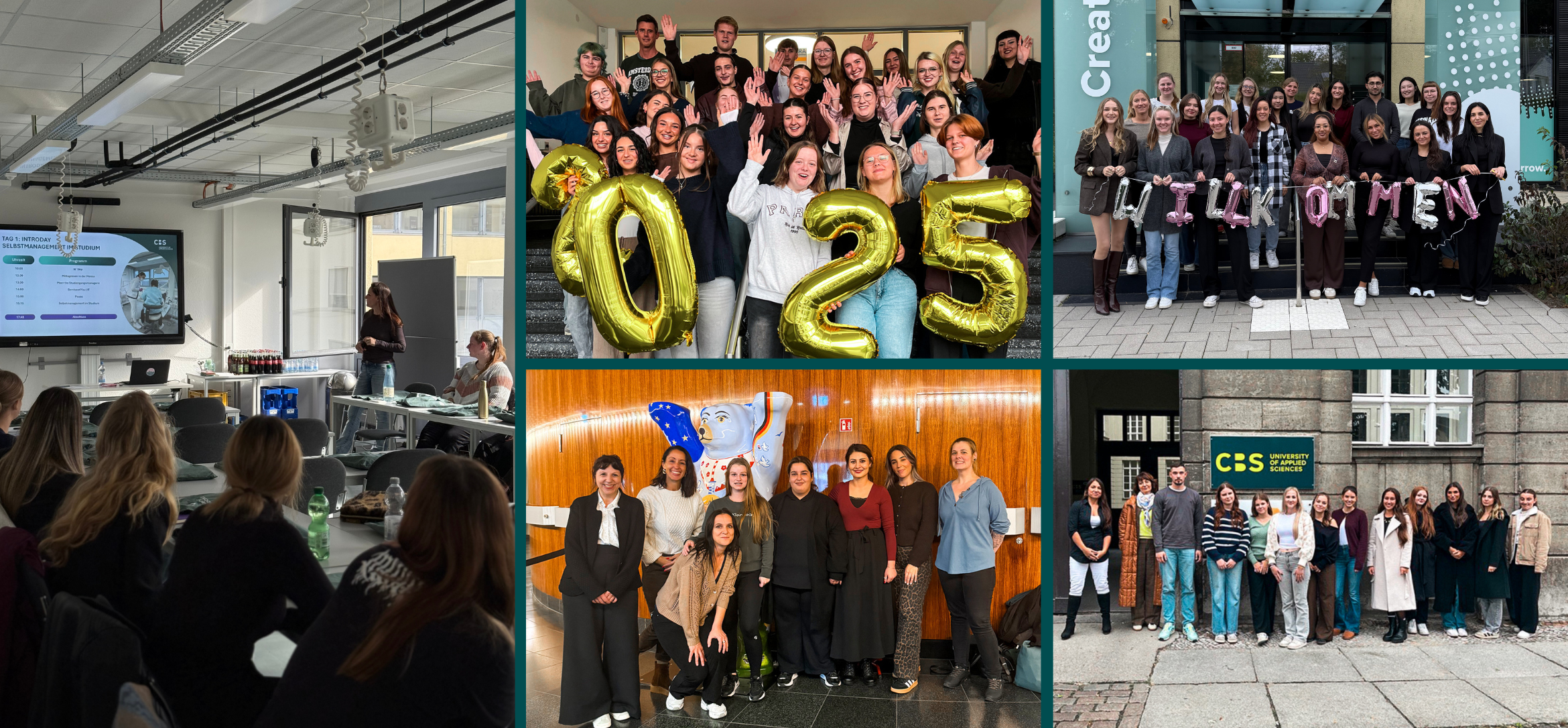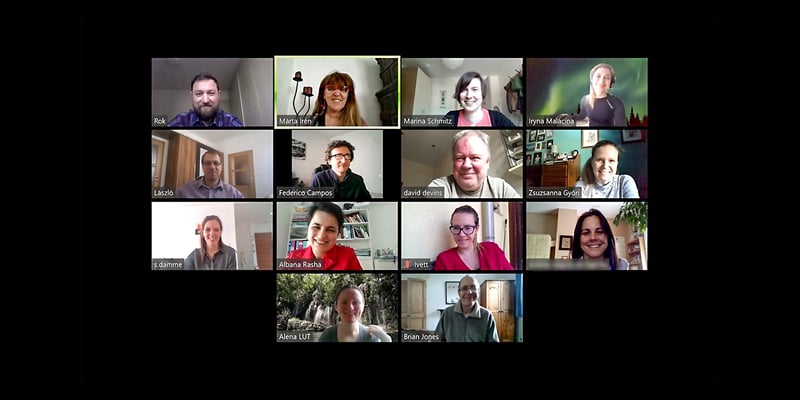Your Logistics Management Programme
Manage global supply chains and develop innovative logistics processes – start your Logistics programme now!

Efficient Processes for the Future – with a Logistics Management Programme at CBS
The logistics sector is steadily growing and is an essential component of industry, trade, and production. Companies rely on smoothly operating logistics systems to remain competitive. Currently, around three million people work in the transport industry – and this number is rising. This expansion shows that the sector continues to grow and that a Logistics programme offers excellent career prospects. In our Logistics programme, you will gain specialised knowledge needed for a leadership role in logistics. You learn to efficiently plan, manage, and optimise transport flows and production processes.
As the logistics industry is highly revenue-driven and continuously evolving, it demands innovative solutions and future-proof processes. A Logistics programme prepares you ideally for a dynamic and secure career.

Tailor Your Logistics Programme Flexibly – Full-time, Dual or Part-time
Our flexible study models adapt perfectly to your life circumstances. Whether dual, part-time or full-time – find the model that suits your goals.

Dual
The dual programme at CBS combines academic theory with practical application in a company. This way, you gain valuable work experience and secure excellent career prospects. Your studies are practical, future-oriented and funded by your partner company.

Part-Time
Studying while continuing to grow professionally – the part-time programme at CBS makes it possible. Flexible learning formats and practical content enable you to advance your career deliberately. Your next career step – without compromise.
Logistics Degree Programmes at CBS – Manage Processes, Connect Markets
Are you looking for a Logistics degree that perfectly fits your lifestyle and future plans? Whether it’s a Bachelor’s in Logistics Management or a Master’s in Logistics Management, explore our Logistics programmes and find your ideal course.

Get Your Free Brochure!
Are you interested in studying Logistics Management and want to learn more? Our free brochure provides all the key details about course content, career opportunities, and admission requirements. Get all the information you need now and take the next step towards your future!

FAQs about the Logistics Degree – Everything You Need to Know!
Are you interested in a Logistics degree but still have unanswered questions? Here, you’ll find answers to the most important topics – from course content to entry requirements.
Find out what to expect in your studies and whether this programme is the right fit for you!
What is Logistics degree?
When you consider any product, you might wonder: how does it get to the shop shelf? Behind every product lies a long planning and manufacturing process. Raw materials sourced from one continent and processed on another often have to be transported to yet another country before they reach the consumer. All these organisational and transport aspects fall under the remit of logistics professionals. They ensure that all goods and raw materials are available in sufficient quantities at the right place, so that production can continue uninterrupted, always maintaining the highest quality and optimal cost efficiency.
What can I expect from a Logistics programme?
In a Logistics programme, you receive a comprehensive education that qualifies you for a variety of leadership roles in the logistics sector. For example, you might be tasked with analysing and optimising existing production processes, which requires the ability to develop new concepts and plans. This specialised knowledge is taught throughout the programme.
Due to the booming logistics sector and high demand for skilled professionals, there is a wide range of logistics courses available. The Logistics programme is divided into an undergraduate (Bachelor’s) course and, optionally, a postgraduate (Master’s) course for deepening and specialising your expertise in transport or production logistics.
Is a Logistics programme right for me?
A Logistics programme demands discipline, motivation, and a strong capacity for organisation. As the field thrives on efficiency and structure, logical thinking and an understanding of business operations are essential.
You should also be able to work analytically, have a good numerical aptitude, and feel confident in technical and scientific contexts. Communication skills and leadership abilities are equally important since logistics processes are often managed and optimised within teams.
If you think economically, take responsibility, and have a talent for planning and organisation, a Logistics programme provides the perfect foundation for a successful career.
What does the Logistics programme cover? What will I learn?
In a Logistics programme, you gain both business and analytical skills to manage and optimise complex logistics processes efficiently. The content varies depending on the qualification.
Bachelor's Programme
You receive a solid education in business studies, covering subjects such as business administration, human resource management, mathematics, statistics, commercial law, and business informatics. In addition, you develop cross-disciplinary skills in English, intercultural management, as well as self- and time management.
The course can be taken full-time or as a dual programme, with an internship integrated only in the full-time model and the option of an exchange semester.
Master's Programme
Your knowledge is deepened through subjects such as Business Economics, Strategic Management, and Digital Transformation. Specific logistics content covers global supply chains, strategic planning, procurement and distribution, as well as operations management.
In addition, international project management and communication skills are taught. The Master’s course can be pursued full-time or part-time alongside employment, with the full-time model including an internship.
What are the entry requirements for a Logistics programme?
The entry requirements depend on the qualification you are aiming for.
For the undergraduate course, you need a general university entrance qualification (such as A-levels or equivalent) or the full specialised entrance qualification. Foreign qualifications such as the Matura, A-Levels, or the IB Diploma are also accepted. Additionally, proof of English language proficiency is required, either through a certificate (no older than two years) or by taking CBS’s free online English test.
For the Master’s course, a first academic degree (Bachelor, Diploma, Magister) from a recognised institution with a minimum grade of “good” is required. If this standard is not met, a separate admissions procedure may be necessary. The first degree should have a focus on business studies and comprise at least 180 ECTS credits. A Numerus Clausus is not required.
How is the Logistics programme structured?
The duration and structure of the programme vary depending on the qualification.
Bachelor's Programme
The Bachelor’s course lasts six semesters and concludes with a bachelor’s thesis, awarding you a Bachelor of Arts (B.A.).
The programme can be taken full-time or as a dual course, with an internship integrated only in the full-time model and the option of an exchange semester. To ensure a practical education, business projects with companies and simulations are incorporated into the curriculum.
Master's Programme
The Master’s course lasts four to five semesters and ends with a master’s thesis, conferring a Master of Science (M.Sc.).
The programme is offered in both German and English and can be pursued full-time or part-time alongside employment. In the full-time model, an internship is included, and there is the possibility of an exchange semester.
Students apply their knowledge in business projects and case studies, addressing real challenges for companies and presenting their solutions.
Logistics Careers: What can I do with a Logistics qualification?
With a Logistics qualification, you can work in various management and consulting roles, including positions such as Logistics Manager, Supply Chain Manager, Transport Manager, or Consultant for Logistics and SCM.
Additional career opportunities exist in areas such as procurement, materials management, hazardous goods management, logistics controlling, and operations management.
Your career prospects are diverse – potential employers span industries such as retail, freight forwarding, airports, seaports, waste management, consulting firms, manufacturing companies, and software firms. This wide range of opportunities opens up exciting possibilities for a secure and future-proof career in logistics.
What can I expect to earn after a Logistics qualification?
Salaries depend on various factors, including your qualification, additional certifications, position within the company, and work experience. Different industries also offer varying salary scales, with very attractive salaries typically found in sectors such as retail and industry.
As an entry-level professional, you can expect a starting salary of approximately €3,300 gross per month if you work in retail or industry, while other sectors – such as transport – may offer different starting salaries.
Logistics Salary - Learn about the earning potential offered by the industry
Where can I study a Logistics management degree?
Discover locations
Discover the diversity of CBS University of Applied Sciences with locations into wholly Germany
Ob pulsating big city or regional vicinity — find the campus that's right for you
Each location combines modern Campus life, innovative Study rooms and option on exciting career opportunities. Discover the place that fits your goals and start your journey towards a successful future.
Your studies, right where thou thee unfold Would like to.
request a brochure now!
Get your free brochure and learn more about:
- Admission requirements
- Application process
- Study formats and time models
- Study programmes and course content
- Semester abroad opportunities
- Financial aid options
Success!
Any questions? We're here to help
Do you have any questions about our bachelor's or master's degree programs? Our Student Advisory team is here to support you! Schedule your personal consultation—online or in person—for tailored, non-binding guidance on finding the right study program for you.

Discover our diverse fields of study
Discover our diverse fields of study – from health and social sciences to education and business. Explore innovative study programs tailored to your career goals, helping you succeed in a dynamic job market.



































































































































































